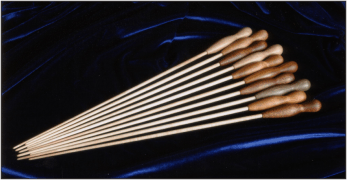A conductor’s baton is a peculiar thing...
It is one of human life’s paraphernalia we can live without. There
is a hard proof for this; despite the fact that man has been playing
music for thousands of years now, the conductor’s baton has a short
history of somewhat less than two hundred years, actually. Ludwig Spohr
was its inventor, or at least one of the first users.
Why hasn’t it vanished with the swiftly changing (musical) fashions then? - you may ask. Maybe the conductor’s baton is also one of those slightly mystical items that - only Heaven knows along what secret trails - can find its way into the abyss of the human soul and pluck special strings. Certainly, you know what I mean : a hunter, an age old cigarette lighter, a Japanese lacquer fountain pen. It is smallish things that, thanks to their beauty, make our lives a bit more pleasurable. And, as a rule, the one who enjoys what he does, will usually do it better. Because beauty itself is a drug in a way. A drug for souls...
However strange it may sound at first hearing, even a conductor’s baton is an instrument, the only silent instrument of the orchestra. Though not as complex as a violin, even a good baton will obviously need some smart design and careful handicraft.
So what is it that makes a good conductor’s baton after all? First of all, it just has to be beautiful. The pleasure, you know... It must feel comfortable and firm in the hand, as if it could hardly wait for its owner to touch it. The baton must be feather light, almost without you feeling it in your hand. And finally, since accidents can always happen, it must be hard to break.
Now the question is how Acer conductor’s batons try to come up to these requirements? The answer is easy: it is a matter of the right selection of materials and careful handwork. They are made from noble hardwoods providing a combination of the gripping and inimitable beauty of wood as a material, workability, slight weight and the required strength at one and the same time. No wonder then that even their name can be traced back here: the shafts of the batons are made of maple (Acer), one of the most beautiful, versatile, and “musical” woods on the Earth.
However true it may be that every cook praises his own broth, we are certain that the batons we offer are of quite high quality and are very likely to meet your expectations. Certainly, it is just hope and not certainty that makes us say so... Anyway, the following idea may fill us with content: if you find that music you happen to hear somewhere sounds more beautifully today, maybe we too have done something for that...
Why hasn’t it vanished with the swiftly changing (musical) fashions then? - you may ask. Maybe the conductor’s baton is also one of those slightly mystical items that - only Heaven knows along what secret trails - can find its way into the abyss of the human soul and pluck special strings. Certainly, you know what I mean : a hunter, an age old cigarette lighter, a Japanese lacquer fountain pen. It is smallish things that, thanks to their beauty, make our lives a bit more pleasurable. And, as a rule, the one who enjoys what he does, will usually do it better. Because beauty itself is a drug in a way. A drug for souls...
However strange it may sound at first hearing, even a conductor’s baton is an instrument, the only silent instrument of the orchestra. Though not as complex as a violin, even a good baton will obviously need some smart design and careful handicraft.
So what is it that makes a good conductor’s baton after all? First of all, it just has to be beautiful. The pleasure, you know... It must feel comfortable and firm in the hand, as if it could hardly wait for its owner to touch it. The baton must be feather light, almost without you feeling it in your hand. And finally, since accidents can always happen, it must be hard to break.
Now the question is how Acer conductor’s batons try to come up to these requirements? The answer is easy: it is a matter of the right selection of materials and careful handwork. They are made from noble hardwoods providing a combination of the gripping and inimitable beauty of wood as a material, workability, slight weight and the required strength at one and the same time. No wonder then that even their name can be traced back here: the shafts of the batons are made of maple (Acer), one of the most beautiful, versatile, and “musical” woods on the Earth.
However true it may be that every cook praises his own broth, we are certain that the batons we offer are of quite high quality and are very likely to meet your expectations. Certainly, it is just hope and not certainty that makes us say so... Anyway, the following idea may fill us with content: if you find that music you happen to hear somewhere sounds more beautifully today, maybe we too have done something for that...
